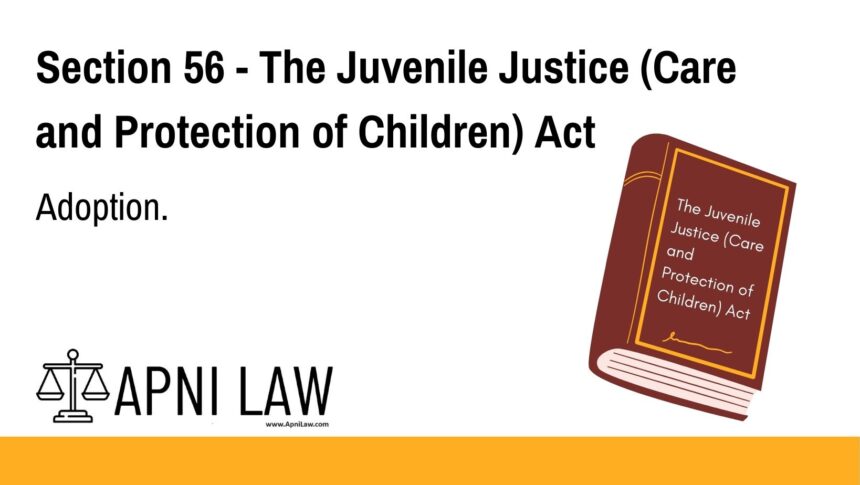Code: Section 56 – Adoption
(1) Adoption shall be resorted to for ensuring right to family for the orphan, abandoned and surrendered children, as per the provisions of this Act, the rules made thereunder and the adoption regulations framed by the Authority.
(2) Adoption of a child from a relative by another relative, irrespective of their religion, can be made as per the provisions of this Act and the adoption regulations framed by the Authority.
(3) Nothing in this Act shall apply to the adoption of children made under the provisions of the Hindu Adoption and Maintenance Act, 1956 (78 of 1956).
(4) All inter-country adoptions shall be done only as per the provisions of this Act and the adoption regulations framed by the Authority.
(5) Any person, who takes or sends a child to a foreign country or takes part in any arrangement for transferring the care and custody of a child to another person in a foreign country without a valid order from the District Magistrate, shall be punishable as per the provisions of Section 80.
Explanation of Section 56 of the Juvenile Justice Act
Section 56 of the Juvenile Justice Act establishes the legal foundation for adoption in India under this law. The primary goal is to ensure that orphaned, abandoned, or surrendered children can grow up in a nurturing family environment.
The adoption process under this Act must follow not only the provisions of the Act itself but also the rules and specific adoption regulations set by the Central Adoption Resource Authority (CARA).
This section allows for relative adoptions across all religions. It clarifies that religious identity will not be a barrier in such family-based adoptions, provided the regulations are followed.
However, the Act does not override the Hindu Adoption and Maintenance Act, 1956. Therefore, any adoptions done under that separate law are excluded from the scope of this Act.
Furthermore, all inter-country adoptions must strictly follow this Act and the adoption regulations. Unlawful international adoption arrangements, or attempts to send a child abroad without proper legal orders, are punishable under Section 80.
Key Provisions:
- Adoption provides a family to orphaned, surrendered, or abandoned children.
- Relative adoptions are allowed regardless of religion.
- Adoptions under the Hindu Adoption and Maintenance Act are not covered here.
- All inter-country adoptions must comply with Juvenile Justice Act and CARA rules.
- Unauthorized international transfer of a child is punishable.
Illustration
Example 1: Legal Domestic Adoption
A couple adopts a child who was surrendered at a government-registered child care institution. The adoption is processed through CARA, ensuring all legal and welfare checks are followed. The child receives a legal family and identity.
Example 2: Relative Adoption
An aunt legally adopts her orphaned niece. Even though they belong to different religions, the adoption is approved as per the Juvenile Justice Act and CARA guidelines, ensuring the child’s care remains within the family.
Example 3: Illegal Inter-Country Custody Transfer
A person arranges to send a child to a foreign family without obtaining an order from the District Magistrate. This act is illegal under Section 56(5) and punishable under Section 80.
Common Questions and Answers
1. What is the main objective of adoption under this Act?
The main goal is to secure a family environment for orphaned, abandoned, or surrendered children.
2. Can relatives adopt a child of a different religion?
Yes. The Act allows relative adoptions irrespective of religious identity, as long as it follows the adoption regulations.
3. What if someone adopts a child under the Hindu Adoption and Maintenance Act?
Such adoptions are governed separately and do not fall under the scope of the Juvenile Justice Act.
4. Are inter-country adoptions permitted?
Yes, but only through legal processes under this Act and the CARA regulations. Unauthorized arrangements are not allowed.
5. What are the consequences of illegal custody transfer to a foreign country?
The person involved will be punished under Section 80 for violating the law.
Conclusion
Section 56 of the Juvenile Justice Act ensures that every child, especially those without parental care, has a legal right to be part of a loving family. It sets out clear rules for domestic, relative, and international adoptions while safeguarding children from illegal practices. By regulating adoption through a legal framework, this section supports the child’s best interests and long-term well-being.
📘 For more legal guidance and detailed analysis of the Juvenile Justice Act, visit ApniLaw.








